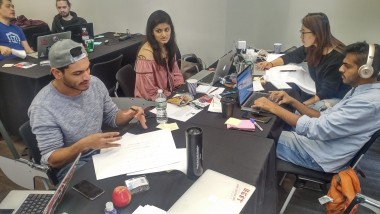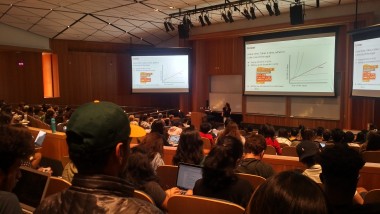I’m the luckiest guy around. I’m definitely over forty – in fact just last week I turned 51 – and not only do I have a mentor under 20, I have hundreds of them! More on that in a moment…
A couple of months ago I wrote a post about the amazing culture at Persistent Systems.In a nutshell, it’s that “the tone” is set from the top with our founder and CEO Anand Deshpande, and that tone empowers change and improvement to percolate up from everywhere in the organization. We are a culture that questions the prevailing paradigm, that breaks the boundaries of traditional thinking and that isn’t afraid to fail.
One example of that is our embrace of hackathons. Many of you reading this may know what a hackathon is, but even if you don’t if you saw the movie The Social Network, then you saw one (albeit Hollywoodized).
OK, so most corporate hackathons don’t involve taking shots as you code! But the idea is that you gather a group of people from divergent disciplines who in an allotted amount of time (48 hours seems to be an ideal timeframe) compete in teams to ideate, code and produce a working prototype that addresses the challenge.
A great example of how we at Persistent team with industry and our partners to do this took place just a few weeks ago at the Mt. Sinai Medmaker Challenge Hackathon in New York City. That’s what I’m addressing in the video above, and I talk a little bit about what hackathons mean to us (and of course rep Cal, and give a shout out to one of my classes… Hey, I’m me!). Here teams came together to develop compelling solutions to help in the treatment of those with cancer. In just 48 hours these teams, comprised of doctors, engineers, marketers, college students and even high school students “brought to market” some amazing solutions. Personally, my favorites were Thomas Fedrigoni, a high school student at Regis High School in New York City, and a team of students who flew back from Harvey Mudd in Southern California. Though neither won, it just shows you the universal pull of these events!
TeddyTracker, just a beautiful demo power of technology & creativity by these @harveymudd students here @MountSinaiNYC #healthhackathon pic.twitter.com/sqSTpqAYVM
— Persistent (@Persistentsys) October 15, 2017
What hackathons really are is a prime example of Divergent Thinking. Even though I’ve worked in technology for 20+ years, I don’t know how to code. So when I returned to Cal last year after a 25 year break between my sophomore and junior years (OK, that’s called dropping out) my CEO Anand really wanted me to take a coding course. I discuss that in the post I linked above. So this semester, along with about 300 UC Berkeley freshmen, I am taking CS10 The Beauty and Joy of Computing! How great a name for a course is that! You can check out the website here. It is an awesome course, because the professor Dan Garcia treats the lectures like a pep rally, presenting complex ideas in a way that gets the students excited and often leads to applause! It’s an awesome course because without exception the TAs are thoughtful, patient and incredibly helpful and encouraging. And it’s an amazing course in huge part because of how awesome my fellow undergrads are who bring a verve and passion for learning every day. Now listen, I’ve got the job already, I’ll get the grade I deserve so none of the above is pandering!
In a lecture just before our midterms, Dan showed a great video by Sir Ken Robinson on the outdated model of education. A key aspect of it was Divergent Thinking. You can go to the 7:30 minute mark to watch the video at this point to hear his take on this, but in fact, the entire video is well worth a watch.
OK, the TL:DR of this is that Divergent Thinking is the capacity for creativity, to see lots of possible answers to a question, and to think laterally – not just linerally. He cites a lognitudinal study that followed kindergartners through high school, to gauge their capacity for this. Now in almost everything you do in life, particularly between those ages, you get far better as you get older. But – and you’re probably guessing this already – the capacity for Divergent Thinking drops dramatically. In kindergarten 98% of the children test at genius level! By the time they are in high school it’s 25%. After the lecture about the impact of technology on society and seeing this videos, there were questions. My friend Ollie asked if there was a way to regain that skill. Dan gave some great examples of things you can do, and then he let me speak to the class (and it’s always a dangerous thing to give Ken a microphone, let alone in front of a group of Cal students!). And what i told them was basically this:
You cannot be afraid to fail. We are all going to fail. Failing does not define you. One of the best things that happened to me in life was failing to originally get my degree, because had I not failed, I would not be here today. But here I am, an executive at a 10,000 person technology company, here with you, who are all smarter than I am, learning more in my classes and from my classmates than I would ever be doing otherwise. I have this idea that everyone over 40 should have a mentor under 20. And that’s what all of you are, in all of my classes, you are my mentors…
And after class so many people came up to me thanking me for sharing my story. And man, I was touched by that.
And so that is my advice. If you’re over 40 (or 30 for that matter) get yourself a mentor under 20. And do it now. And no, it’s not so you can keep up with pop culture or watch the Grammys and actually know who the performers are… It’s because, try as we might, the world will pass us by. People are communicating in entirely different ways than you realize. They’re thinking in ways that are non-traditional and non-linear. And what you don’t know will doom you. Almost just by osmosis, just by being around my fellow undergrads (I love saying that), I can feel my capacity for Divergent Thinking increasing every day. Oh, and they’re a lot of fun too!
I know I’ve got it great. Not only does Persistent allow someone like me to go back to school to finish my studies (while accommodating my working full-time mind you), they encourage it and are fully onboard. Because at Persistent, we know that while a Classic Civilizations degree from Berkeley may not be exactly germane to heading global communications for a technology company, it’s through that pursuit of the degree that I’m actually able to gain a new perspective on the technical work we do, and get insight into how the world is changing and how that impacts our outlook on work, and even connect better with important customers. And regain my capacity for Divergent Thinking!
One last thing, one of the reasons I tell students at Cal it’s so easy for us to be friends is that although I might be more than twice their age, I have half their maturity. Proof of that; I felt bad in the opening remarks at Mt. Sinai because I left out my 18-year old labmate Matt Pearson… So during the closing remarks, I made sure to give him a plug! Hey, there’s a chance I may be working for him someday!
I’d love to hear your thoughts on Divergent Thinking, how technology is impacting society and the power of having a mentor under 20







